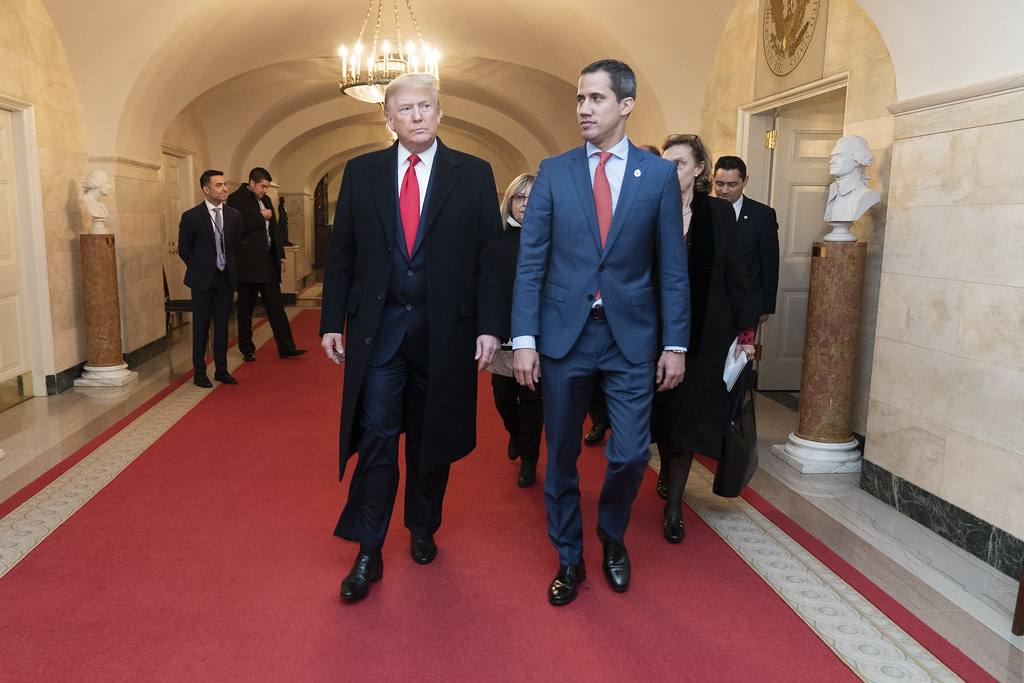By José Luis Granados Ceja for Venezuelanalysis
The Trump administration openly considered a military invasion of Venezuela, going so far as to discuss the plot with opposition figures, former US Secretary of Defense Mark Esper revealed in his recently released memoir.
Esper, who served as secretary of defense from July 2019 to November 2020, wrote in his book, A Sacred Oath, of meetings at the White House on February 5, 2020 between White House officials, including former US President Donald Trump, and Venezuelan opposition figures Juan Guaidó, Julio Borges and Carlos Vecchio.
Trump had a year earlier recognized Guaidó as “interim president” of Venezuela as part of an effort to oust President Nicolás Maduro from power. The scheme ultimately failed, leading to more and more brazen efforts to prompt regime change, including calls for a military uprising against Maduro and mercenary invasions.
Esper writes that based on Guaidó’s responses in the meeting, he concluded that the opposition was willing to embrace US support for an invasion of Venezuela from Colombia using US-trained mercenaries, but that the opposition leader was more interested in having US troops directly invade instead.
“Esper’s account was terrifying because it underscores how close the U.S. came to overt military action in Venezuela,” Latin American policy expert and campaigner with CODEPINK, Leonardo Flores, told Venezuelanalysis.
According to Esper’s telling of the meeting, at one point either Borges or Vecchio made mention of a still-yet-unknown scheme, the opposition figure then looked directly at Mauricio Claver-Carone, former senior director at the National Security Council and current president of the Inter-American Development Bank, who was also in the room. Esper wrote that Claver-Carone was “pressing the hardest for military action” during the meeting.
The scheme was soon revealed to be an assasination plot.
Months after the meeting at the White House with Guaidó, Venezuela foiled an effort by a 60-man paramilitary force organized by US special operations veteran Jordan Goudreau and retired Venezuelan Major General Cliver Alcalá to infiltrate the country with the aim of assassinating Maduro.
Esper claimed that he was not aware that the plans discussed in the meeting were actually an assassination plot against Maduro and that he went to CIA Director Gina Haspel to ascertain what they were planning.
The revelations by the former secretary of state are the latest evidence that the plot, known as “Operation Gideon”, counted on the support and participation of high-profile Venezuelan opposition figures, despite denials from Guaidó.
Esper likewise claims that Haspel did not know about the plot, but an October 2021 investigation by VICE News revealed that the US government had knowledge of the coup plot but did nothing to stop it or warn Caracas. President Trump and then Secretary of State Mike Pompeo denied any White House knowledge or responsibility after the operation’s failure.
The book additionally details a meeting on June 9, 2020 where National Security Advisor Robert O’Brien proposed a military attack on the José Antonio Anzoátegui Petrochemical and Industrial Complex, Venezuela’s main oil hub. The Trump government abandoned the idea but not before also flirting with a naval blockade of Cuba and Venezuela, eventually settling on “less direct options” to be carried out by the opposition but fully backed by the US.
Trump had long suggested military action in order to oust Maduro from power, saying in 2018 that “all options were on the table” and reiterated the possibility in 2019 after meeting with Colombian President Ivan Duque. Shortly after that meeting, Trump imposed more sanctions on Venezuela and national security adviser John Bolton was seen leaving the White House with a notepad with “5,000 troops to Colombia” written on it.
US Vice-president Mike Pence repeated the “all options on the table” threat in 2019 at a meeting of the ad-hoc Lima Group, a coalition established by right-wing governments in the region aimed at ousting Maduro.
Pence’s threats came mere days after the failed effort by the Venezuelan opposition and its allies to invade the country from neighboring Colombia under the guise of forcing a “humanitarian aid” convoy into Venezuela.
The information disclosed in Esper’s book comes as US President Joe Biden weighs whether or not to invite Venezuela, Cuba, and Nicaragua to the upcoming Summit of the Americas in Los Angeles. US Assistant Secretary for Western Hemisphere Affairs Brian A. Nichols claimed that Biden would not invite the three countries due to allegedly not respecting democratic norms.
However, the US has since faced significant diplomatic pushback from the region’s leaders, with several saying they will not attend if countries are excluded from the summit.
Former Bolivian President Evo Morales, himself ousted via a US-backed coup in 2019, questioned the US’s posture vis-a-vis Venezuela given Esper’s revelations.
CODEPINK’s Leonardo Flores explained to Venezuelanalysis that although the Biden administration had shown some progress in its approach to Venezuela, without lifting sanctions and an end to US support for Guaidó “there’s effectively no difference between Trump’s ‘maximum pressure’ campaign and the Biden approach.”
Flores added that the Biden administration’s decision to not invite Venezuela, Cuba and Nicaragua was “backfiring” and that ”US actions in the region should make it a pariah state unworthy of hosting regional summits.”
“We’re in an era in which US rhetoric of ‘democracy’ and ‘human rights’ is no longer fooling the peoples of the Americas, including in the United States itself,” said Flores.
“The US is not credible on these issues and the revelations in Esper’s book merely confirm that we’re dealing with a government – regardless of who is in office – that will go to extreme lengths to achieve its policy priorities,” he added.
The Biden government has still not issued official invitations to the Summit of the Americas and the White House’s mishandling of preparations has led analysts to question the degree of influence that the US still holds in Latin America.
Edited by Ricardo Vaz in Caracas.

